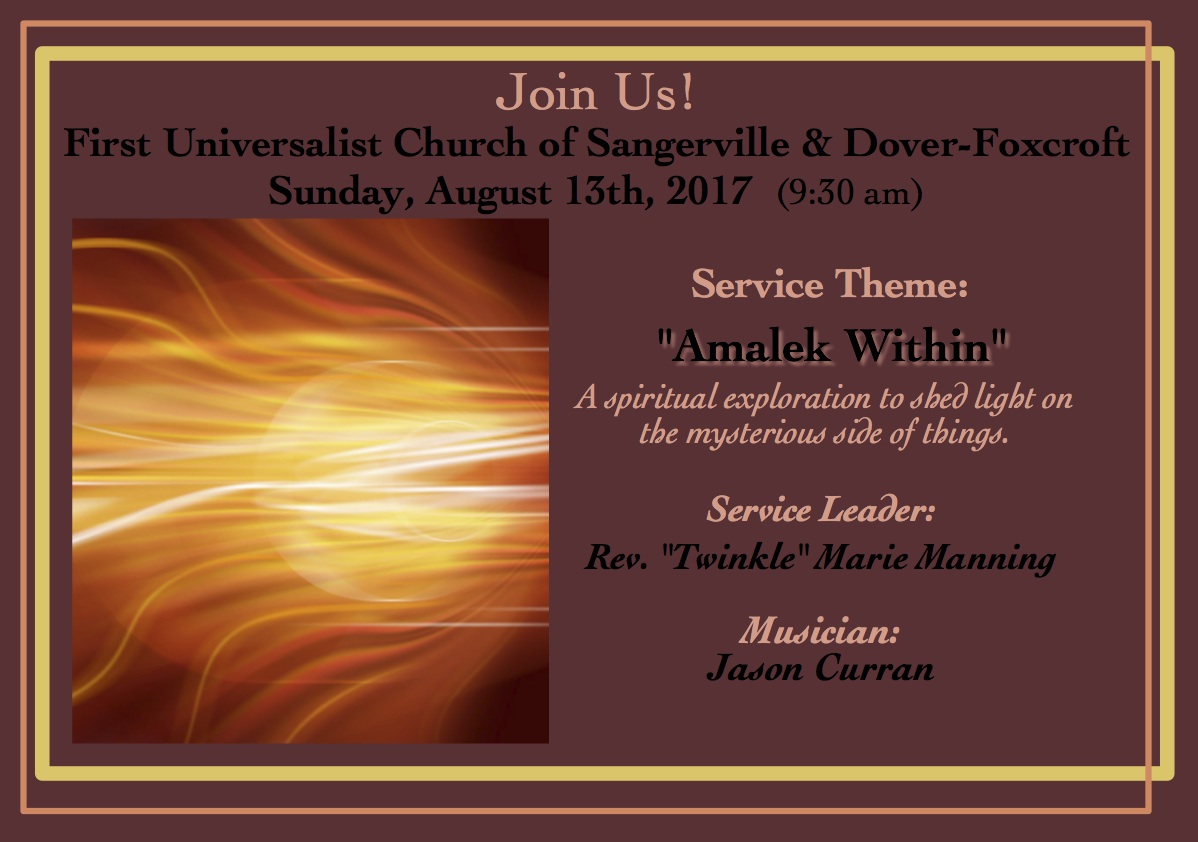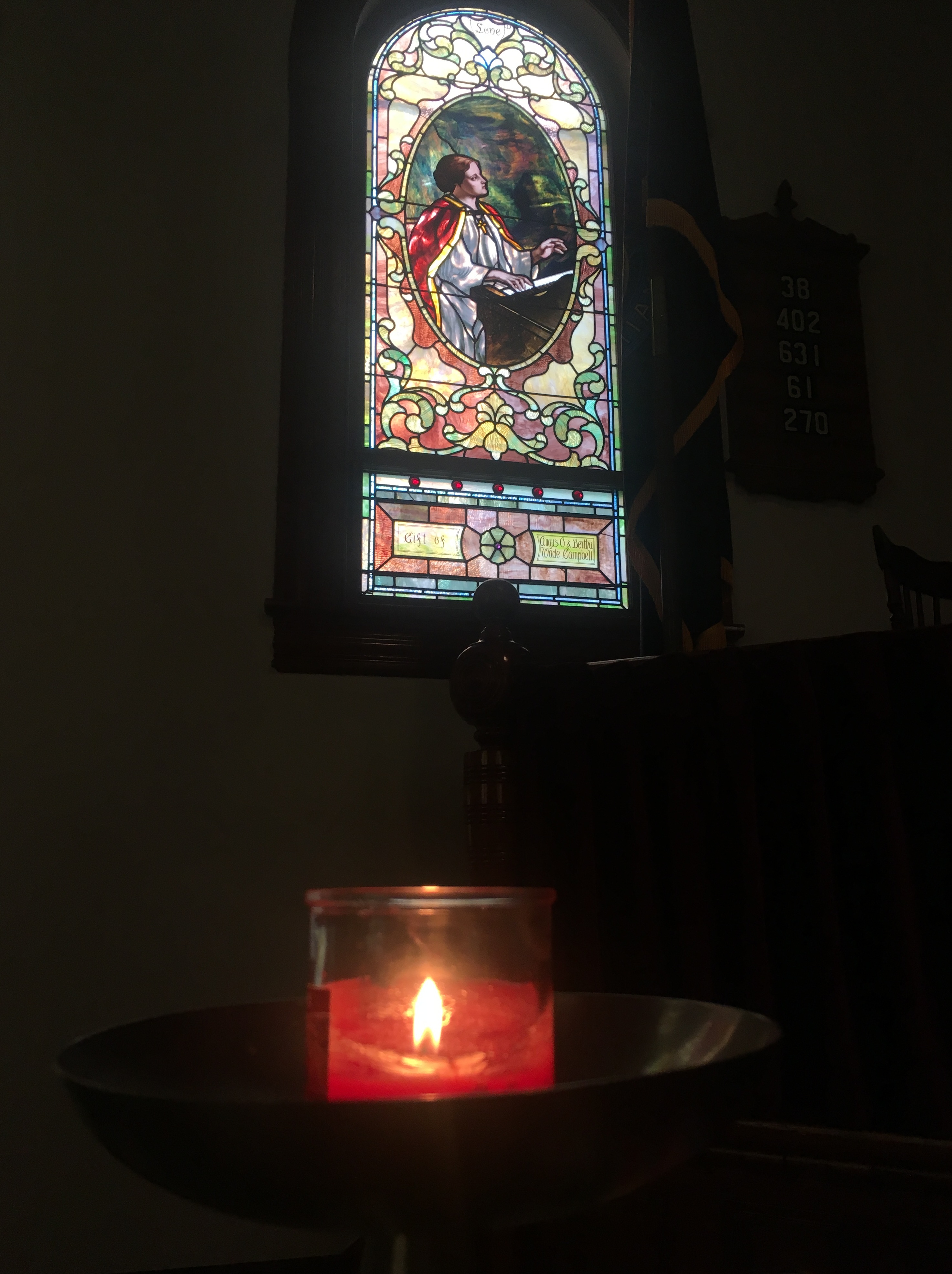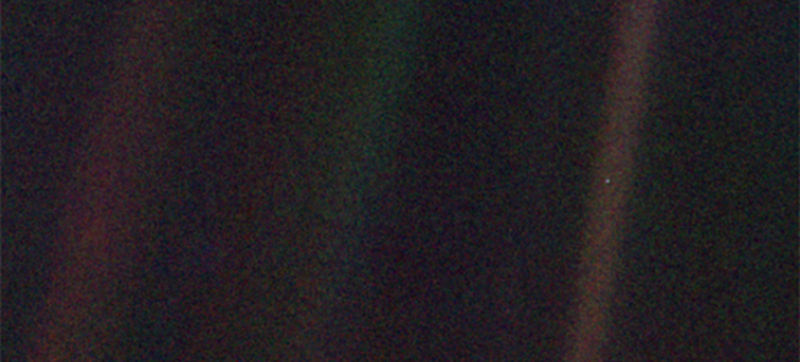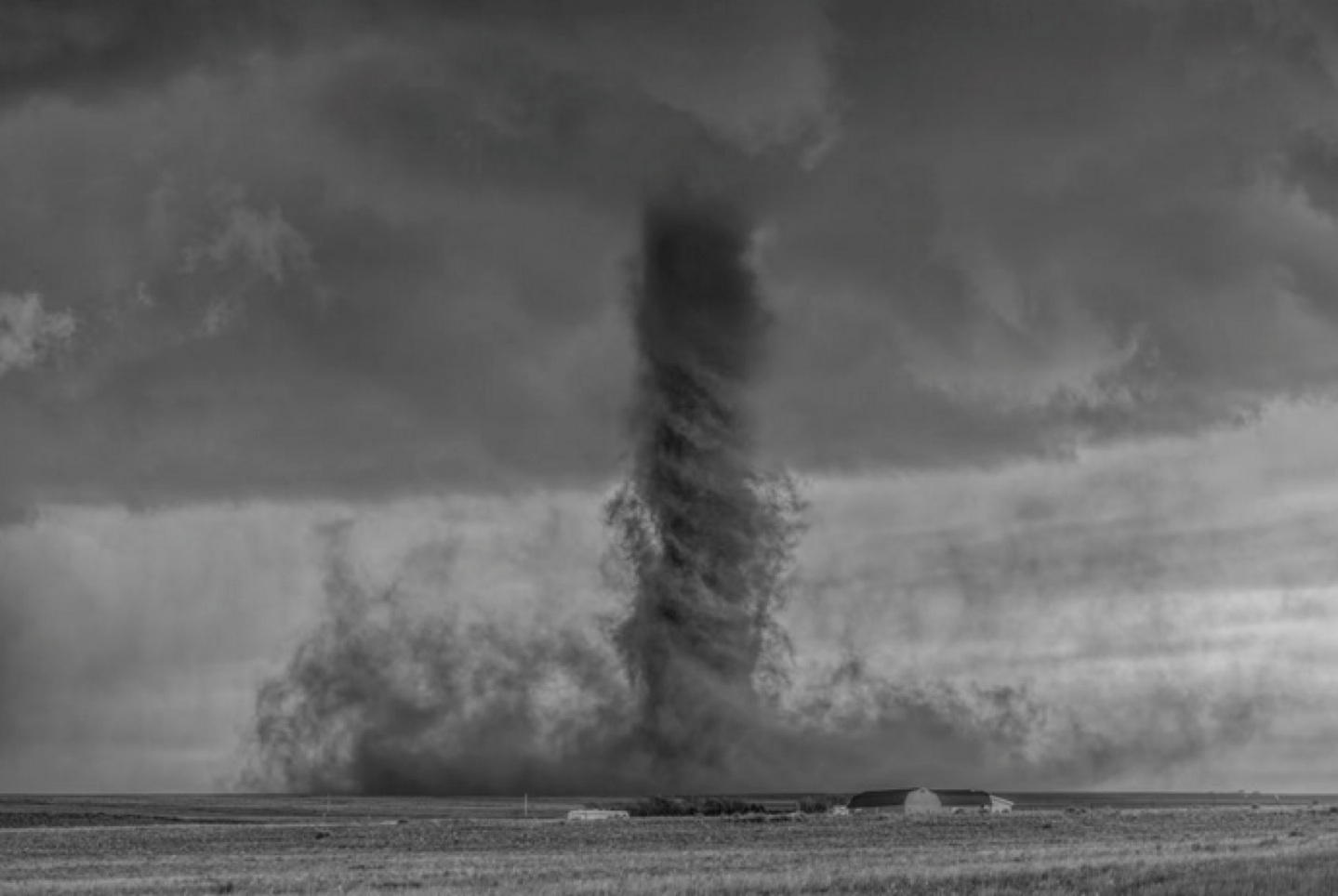Soundbite: Surrender to Prayer:
Service Leader: Rev. “Twinkle” Marie Manning
Musician: Jason Curran
Sermon: Amalek Within
Reading #1 “Pale Blue Dot” by Carl Sagan
Reading #2 “Not to be Extinguished” by Twinkle
Opening Hymn #160 Far Too Long, by Fear Divided
Second Hymn #194 Faith is a Forest
Closing Hymn #213 – There’s a Wideness in Your Mercy
OPENING
“My will has disappeared
Now my confusions
Oh so clear
Temptation, temptation, temptation
Can I persist?”
modified: Diana Krall /Tom Waits Lyrics
CHALICE LIGHTING
“We light this chalice as a symbol of our faith, and a reminder of the spark of divinity within each of us.”
“Not to be Extinguished” by “Twinkle” Marie Manning
SERMON: AMALEK WITHIN
Every Sunday
As we gather here
We know
Someone’s heart is breaking
Someone’s soul is soaring
Someone’s mind is racing
We, each of us, bring along to this church, our joys, our sorrows, our dreams, and our fears.
Real or imagined.
Coerced by others or self-imposed,
they join us here in these pews.
And it is up to us to create a space
so sacred
and so secure so as to be able to contain it all.
Holding the joys and triumphs of some in the same space and time
as the sorrows and anxieties of others
can be complex,
especially when a heart overflowing with exaltation
meets the eyes of one in despair.
Yet, I believe we are up for this challenge.
Acknowledging the existence of, and allowing exploration into, uncomfortable areas to help with identifying the potential influences we are impacted by are of primary importance.
These external and internal forces are with us as we go about our daily lives.
Sometimes they are among our greatest assets.
Other times, our worst enemy.
There are words we don’t hear spoken of too very much in our Unitarian Universalist faith.
Sin, Evil, Enemy are some such words.
Perhaps an evolutionary sidestep in our strivings to create language that supports our “All Are Welcome” moniker.
Perhaps, a shying away from, as we attempt to create an atmosphere of Universal Love.
Good motives, yes, but it is useful to see the framework
inclusive of all its parts.
So for a few minutes today, let’s shed some light on the darker side of things and embark on a spiritual exploration together.
Perhaps there are truths to be revealed in the mysterious tales of our cultures.
Perhaps they can stand alone as metaphor enough to impact how we go about our lives.
There is a story in the Hebrew Scriptures about the tribe of Amalek.
The Amalekites were said to be semi-nomadic (wanderers) and lived in the land called Moab of ancient Israel.
They were cause of significant worry to the tribes of Israel at the time because the Amalekites were notorious for their sneak attacks and targeting of the most vulnerable in the Jewish communities.
Amalekites always attacked the rear of their encampments where typically the sick, the elderly, and the children were.
And, they were ferocious.
Because of this,
as the ancient story goes,
the tribes of Israel were commanded to wipe out Amalek wherever they encountered them.
As time went on, it became clearer that this story was perhaps more allegory than history.
Rabbi Daniel Bogard says,
“Sages realized that Amalek wasn’t an ethnic group–they were an inclination.”
And he says that,
“In every generation, we are told, Amalek rises again, and in every generation, we are obligated to stand with the vulnerable against those who would oppress them.”
At a time when we have leaders who are seeking to strip people
of human rights, of dignity, of choice.
At a time when countless are being denied access
to health-care, to nutritious food, to living in safe homes,
even some being denied access to serve our country in military service.
At a time when our Earth is being desecrated,
her natural resources are being pillaged,
and skies are being polluted to devastating degrees
because of absolute greed.
I think it is safe to say Amalek has risen.
And it is our obligation to protect the vulnerable from such an enemy.
Rabbi Bogard prophesied,
“In every generation Amalek returns; now is the time for our generation to stand with the vulnerable, to stand up for a more inclusive and humane world, and to push back against the evil of this Amalek.”
Amalek is the prodigal enemy of freedom. The enemy of peace.
And, Amalek is not just an exterior force.
Amalek attacks from the inside as well.
Yes, there is Amalek within each of us.
The Amalek Within.
It is of benefit to acknowledge this and explore its significance.
Swiss psychiatrist and psychoanalyst, Carl Jung, speaks of this when he says,
“Everyone carries a shadow, and the less it is embodied in the individual’s conscious life, the blacker and denser it is….. if it is repressed and isolated from consciousness, it never gets corrected.”
Don Juan, the spiritual teacher of the Carlos Castaneda books,
referred to such a dark force
in a more triggering way
in which he calls the internal predator.
He says,
“We have a companion for life…We have a predator that came from the depths of the cosmos and took over the rule of our lives. Human beings are its prisoners. The predator is our lord and master.”
Castaneda says these aliens act as mental predators,
prompting destructive emotions of fear, anxiety, anger,
despair, jealousy and competitiveness
which create the kind of energetic qualities that feed them
and give them strength and influence over us.
In the Bible – this lord and master – this ruler of the world – is called Satan the Devil,
an angel turned demon bent on luring humankind away from the God of Love and causing harm to each other.
An Adversary said to use temptation is its primary tool.
Another Adversary appearing in the form of a demon offering great temptation was Mara to the Buddha.
Time and again, the parable of Mara stands for the
tempestuous longings and fears that assail us,
as well as the views and opinions that confine us to a certain kind of
paralysis of body, mind and spirit.
Affecting not only the psychological realm but the physical as well.
The Druids, Celtic and Norse traditions all point to various
elemental creatures – seen and unseen – who tempt and entice both
The Goods and The Ills of our humane nature.
The Ojibwa and other indigenous peoples identify this dark force as the
Wétigo or Windigo (Wendigo).
Alternately, depending on the tribe, it is seen as a virus or entity that
infects people like a parasite or spirit possession,
consuming the life force of the host.
Philosopher Ralph Waldo Emerson and Mystic Eckhart Tolle
are among those who refer to
such distractive and destructive forces
as Ego
that reveal themselves in compulsive thought processes.
These are but a glimpse at they types of conclusions drawn by those who
have examined the reasons behind thoughts and behaviors that are
in opposition to anything we call Holy,
and to anything resembling that which would be considered
humane, compassionate, benevolent.
Indeed, around the world credence is given in virtually every culture
to the idea that we are being influenced outwardly and inwardly.
The key is to be aware of this.
And, creatures of habit – as we humans are,
it is important to create mindfulness systems that produce habits
that support the ways in which we most want to think, and feel, and behave.
With out such structures in place,
such internal and external methods practiced and honed,
we can easily fall prey to Amalek, to the Adversary.
Jesus of the Bible cautioned us with the principle that “no one can serve two masters.”
In the book of Matthew, where he is quoted as stating this, he was talking about the love of money being an injurious thing.
We can carry this sentiment over to any of the ills of our human nature.
We can vanquish the ill, or at least minimize its negative impact by
First identifying the dark side of human nature,
not just the dark side,
but our dark sides,
individually and collectively.
Name it.
Clarify it.
Greed, for instance:
Hunger is not greed
and greed is not hunger.
Hunger is satisfied
when it is nourished.
Greed is only satisfied
while it is consuming.
Whether feeding hunger or fueling greed,
we actively impact ourselves and each other.
And we do so in myriad ways.
Physically – with choices that
help or hinder life on our planet.
Energetically – by thoughts and actions
that create harmony or disharmony.
The reaction to Amalek is typically one directional:
– Blaming someone else
or
– Blaming ourselves.
The cost is high either way, so it is crucial to understand the didactic
evidence of the deep roots of Amalek,
and once aware,
to take the time to mindfully consider what to do with such knowledge.
How to potentially dissolve
or at least disrupt
Amalek’s cycles of influence.
Like the story of Jesus, who was approached by the Adversary while fasting in the wilderness,
Buddha too was most often approached by Mara while
alone, meditating or fasting.
These accounts remind us to be aware that during the times when we are focused on positive things
does not prevent negative influences from challenging us.
Indeed, as we strive towards positive changes in our lives,
we can count on encountering challenges.
There are also accounts of Mara approaching the Buddha
while he was instructing his students and
when he was addressing large gatherings,
and even when doing the seemingly mundane tasks of any given day.
Reminding us that such Adversaries can seek to distract us at any given moment of the day or night.
With thoughts that sound like our own voices, or the voices of those we can be most influenced by. And even with dreams that mislead.
The Wétigo and the Predator, too, instilling feelings of fear or numbness that distract us from the good that is with us.
Such feelings taking away our sense of purpose
as swiftly as they consume our energy.
In many ways, like the tribes of Israel, we live in exile.
We go about our lives feeling disconnected to each other,
disconnected to source,
disconnected to a sense of purpose.
We, each of us, have our own version of Amalek that we carry with us.
A burden that precipitates
– and simultaneously emphasizes –
the effect of Amalek.
OH – Amalek is easy to identify on the outside!
Amalek in the form of a president or king who is
selfish and greedy
and seeks to cause harm to whole nations of people,
YES that is easy to identify.
But Amalek on the inside?
Who often masquerades as our own voice?
Convincingly persuading us away from our Heart’s desire?
And Soul’s purpose?
That
Yes, that, can be more difficult to recognize.
To unmask The Amalek Within takes practice.
To vanquish Amalek, if possible, takes faith.
For Unitarian Universalists that faith, that confidence begins with the First Source from which we draw faith and wisdom from. Namely,
- Direct experience of that transcending mystery and wonder, affirmed in all cultures, which moves us to a renewal of the spirit and an openness to the forces which create and uphold life.
Emerson spoke to us about just such a force when he described
the function of
the Over-Soul:
Reflecting on the divine nature of the human soul,
as connected to the collective consciousness of the Universe.
One of the key attributes to the Over-Soul is the connection
of the Human Soul
to the Soul of God.
And to this we have access to at all times, for we are part of it,
even as it is part of us.
Whether we accept the idea that there are nefarious unseen forces influencing us internally and externally;
or we view the symbol of Amalek as the personification of our greatest fears;
or even simply a result of human brain chemistry and hormones causing errant (or sometimes perpetual) negative thoughts and feelings;
storms of our own minds’ makings.
We can take heart that we are not alone in these experiences of the darker sides of our nature. For this is a burden we each carry.
We can know, too, that we have places to turn to help build resilience, especially when we are feeling vulnerable.
One thing that we can each do,
is to begin a practice of resetting our thoughts and feelings
when we recognize them as adversarial, non-beneficial.
I am talking specifically about the inner-critic.
You know – – – the thoughts that tell us that we are not good enough.
The berating thoughts;
the thoughts that distract us from what brings us the most joy.
And the thoughts that assign us as judge and critic of others.
These are the Amalek within, sneaking up on us, attacking us from the inside when we are most vulnerable
or when we are not prepared
and easily distractable.
Often they are quiet, tiptoeing in unnoticed at first.
When you find yourself detouring along the paths of such thoughts,
know that you can instantly dissolve their impact by observing them,
and change your direction by steering toward positive thoughts.
Likewise with feelings, that are often even more powerful than thoughts.
Once we notice ourselves sinking into feelings of despair,
we are in a position to redirect them.
That is not say we want to invalidate our emotions.
It is ok, even healthy, to allow ourselves to feel our sadness.
But to be consumed by sadness, to allow anxiety and fear to cripple us
is unnecessary.
One effective way to move our thoughts and feelings into the directions we want is to Move Our Bodies and our Voices.
Go for a run.
Walk your dog.
Do yoga or stretches.
Sing.
Dance.
Even if you are alone in your kitchen – Dance.
Move Your Body and your thoughts and feelings will follow.
But there is something even more important than learning such self-discipline.
In fact, it can give you the courage and strength to create healthy new patterns.
Rev. Ian White Mayer’s first and foremost solution to every challenge is:
“To Invite God In.”
He says that,
“Once I’ve called myself to rest in the spiritual place, then the other solutions appear.”
This is a form of surrender that we can find – uncomfortable, at first.
Especially when we, as a non-creedal faith tradition without doctrines, have an ambiguous interpretation of God.
But, my guess is, that we each have something that we feel is Holy.
And I urge you to turn to that first.
When feeling vulnerable,
when feeling scared,
when feeling like you are just
not quite
feeling like yourself,
Turn to that which you identify as Holy,
identify as Sacred.
And, if I may suggest:
Surrender to that.
And, by “surrender,”
I mean Pray.
And here is the thing:
Prayer can be as diverse as our interpretations of that which we call Holy.
Prayer can be found in stillness:
Intentionally being still. Being silent.
Sitting in your home or at the river or ocean or lake,
In the midst of a forest,
In Sunshine or Starshine or Rain.
Prayer can be your voice:
Chanting as you are
Drawing down the moon
Or Singing a lullaby to your child,
or to yourself.
Prayer can be visualization:
Envisioning that which you wish to be made manifest.
Seeing and focusing in your mind
your fondest dreams and most heartfelt desires.
Prayer can be the act of writing:
A poem or words written in stream of consciousness.
Prayer can be expressions of Deep Gratitude:
“Abundant Earth Mother, thank you for the nourishment you provide us each day.”
Prayer can be pleas for help, and for guidance:
“Dear God, I don’t know how I am going to face what is next, please help me see the path that is mine to take, and instill in me the courage to take it.”
Prayer can be a blessing or mantra:
“Ah-teh, Mal-Kooth, Vay-Gay-Boo-Rah, Vay-Ga-Doo-Lah, Le-Olam, Ah-men”
(Though Art within me, The Kingdom, And the Power, And the Glory, Forever Amen)
Prayer can be a single word, simply felt or thought and released to the Divine:
“Love.”
Every day
We know
Someone’s heart is breaking
Someone’s soul is soaring
Someone’s mind is racing
Let us together remember
to create the space to hold all this
and create a world of hope and blessing
through prayer.
Amen.
CLOSING HYMN: #213 – There’s a Wideness in Your Mercy
CLOSING WORDS
First Parish in Concord Benediction:
“Go out into the world in peace,
have courage,
hold on to what is good,
return to no person evil for evil,
strengthen the faint-hearted,
support the weak,
help the suffering,
honor all beings.”
POSTLUDE – Jason Curran
Deep gratitude as always to collaborate with Jason Curran as he brings his beautiful music to the Unitarian Universalist Church of Sangerville and Dover-Foxcroft, Maine!!!




